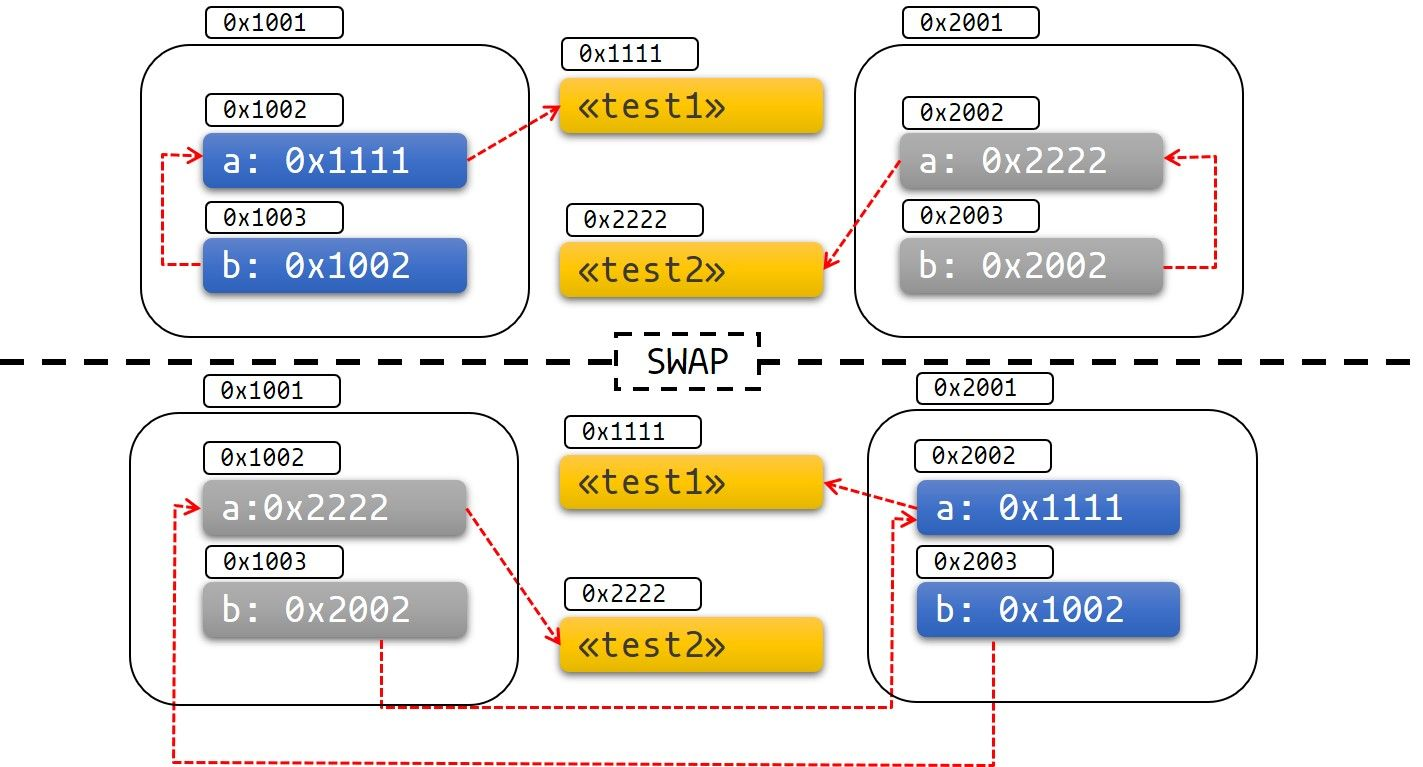rust高级 异步编程 二 pin(1)https://developer.aliyun.com/article/1392111
原因是 test2.b 指针依然指向了旧的地址,而该地址对应的值现在在 test1 里,最终会打印出意料之外的值。
如果大家还是将信将疑,那再看看下面的代码:
fn main() { let mut test1 = Test::new("test1"); test1.init(); let mut test2 = Test::new("test2"); test2.init(); println!("a: {}, b: {}", test1.a(), test1.b()); std::mem::swap(&mut test1, &mut test2);// 在两个可变位置交换值 test1.a = "I've totally changed now!".to_string(); println!("a: {}, b: {}", test2.a(), test2.b()); }
下面的图片也可以帮助更好的理解这个过程:
Pin 在实践中的运用
将值固定到栈上
回到之前的例子,我们可以用 Pin 来解决指针指向的数据被移动的问题:
use std::pin::Pin; use std::marker::PhantomPinned; #[derive(Debug)] struct Test { a: String, b: *const String, _marker: PhantomPinned, } impl Test { fn new(txt: &str) -> Self { Test { a: String::from(txt), b: std::ptr::null(), _marker: PhantomPinned, // 这个标记可以让我们的类型自动实现特征`!Unpin` } } fn init(self: Pin<&mut Self>) { let self_ptr: *const String = &self.a; let this = unsafe { self.get_unchecked_mut() }; this.b = self_ptr; } fn a(self: Pin<&Self>) -> &str { &self.get_ref().a } fn b(self: Pin<&Self>) -> &String { assert!(!self.b.is_null(), "Test::b called without Test::init being called first"); unsafe { &*(self.b) } } }
我们使用了一个标记类型 PhantomPinned 将自定义结构体 Test 变成了 !Unpin,因此该结构体无法再被移动。
一旦类型实现了 !Unpin ,那将它的值固定到栈( stack )上就是不安全的行为,因此在代码中我们使用了 unsafe 语句块来进行处理,你也可以使用 pin_utils 来避免 unsafe 的使用。
Rust 中的 unsafe 其实没有那么可怕,虽然听上去很不安全,但是实际上 Rust 依然提供了很多机制来帮我们提升了安全性,因此不必像对待 Go 语言的 unsafe 那样去畏惧于使用 Rust 中的 unsafe ,大致使用原则总结如下:没必要用时,就不要用,当有必要用时,就大胆用,但是尽量控制好边界,让 unsafe 的范围尽可能小
此时,再去尝试移动被固定的值,就会导致编译错误:
pub fn main() { // 此时的`test1`可以被安全的移动 let mut test1 = Test::new("test1"); // 新的`test1`由于使用了`Pin`,因此无法再被移动,这里的声明会将之前的`test1`遮蔽 let mut test1 = unsafe { Pin::new_unchecked(&mut test1) }; Test::init(test1.as_mut()); let mut test2 = Test::new("test2"); let mut test2 = unsafe { Pin::new_unchecked(&mut test2) }; Test::init(test2.as_mut()); println!("a: {}, b: {}", Test::a(test1.as_ref()), Test::b(test1.as_ref())); std::mem::swap(test1.get_mut(), test2.get_mut()); println!("a: {}, b: {}", Test::a(test2.as_ref()), Test::b(test2.as_ref())); }
是的,Rust 并不是在运行时做这件事,而是在编译期就完成了,因此没有额外的性能开销!来看看报错:
error[E0277]: `PhantomPinned` cannot be unpinned --> src/main.rs:47:43 | 47 | std::mem::swap(test1.get_mut(), test2.get_mut()); | ^^^^^^^ within `Test`, the trait `Unpin` is not implemented for `PhantomPinned`
需要注意的是固定在栈上非常依赖于你写出的 unsafe 代码的正确性。我们知道 &'a mut T 可以固定的生命周期是 'a ,但是我们却不知道当生命周期 'a 结束后,该指针指向的数据是否会被移走。如果你的 unsafe 代码里这么实现了,那么就会违背 Pin 应该具有的作用!
一个常见的错误就是忘记去遮蔽( shadow )初始的变量,因为你可以 drop 掉 Pin ,然后在 &'a mut T 结束后去移动数据:
fn main() { let mut test1 = Test::new("test1"); let mut test1_pin = unsafe { Pin::new_unchecked(&mut test1) }; Test::init(test1_pin.as_mut()); drop(test1_pin); println!(r#"test1.b points to "test1": {:?}..."#, test1.b); let mut test2 = Test::new("test2"); mem::swap(&mut test1, &mut test2); println!("... and now it points nowhere: {:?}", test1.b); }
固定到堆上
将一个 !Unpin 类型的值固定到堆上,会给予该值一个稳定的内存地址,它指向的堆中的值在 Pin 后是无法被移动的。而且与固定在栈上不同,我们知道堆上的值在整个生命周期内都会被稳稳地固定住。
use std::pin::Pin; use std::marker::PhantomPinned; #[derive(Debug)] struct Test { a: String, b: *const String, _marker: PhantomPinned, } impl Test { fn new(txt: &str) -> Pin<Box<Self>> { let t = Test { a: String::from(txt), b: std::ptr::null(), _marker: PhantomPinned, }; let mut boxed = Box::pin(t); let self_ptr: *const String = &boxed.as_ref().a; unsafe { boxed.as_mut().get_unchecked_mut().b = self_ptr }; boxed } fn a(self: Pin<&Self>) -> &str { &self.get_ref().a } fn b(self: Pin<&Self>) -> &String { unsafe { &*(self.b) } } } pub fn main() { let test1 = Test::new("test1"); let test2 = Test::new("test2"); println!("a: {}, b: {}",test1.as_ref().a(), test1.as_ref().b()); println!("a: {}, b: {}",test2.as_ref().a(), test2.as_ref().b()); }
将固定住的 Future 变为 Unpin
async 函数返回的 Future 默认就是 !Unpin 的。
但是,在实际应用中,一些函数会要求它们处理的 Future 是 Unpin 的,此时,若你使用的 Future 是 !Unpin 的,必须要使用以下的方法先将 Future 进行固定:
- Box::pin, 创建一个 Pin>
- pin_utils::pin_mut!, 创建一个 Pin<&mut T>
固定后获得的 Pin 和 Pin<&mut T> 既可以用于 Future ,又会自动实现 Unpin。
use pin_utils::pin_mut; // `pin_utils` 可以在crates.io中找到 // 函数的参数是一个`Future`,但是要求该`Future`实现`Unpin` fn execute_unpin_future(x: impl Future<Output = ()> + Unpin) { /* ... */ } let fut = async { /* ... */ }; // 下面代码报错: 默认情况下,`fut` 实现的是`!Unpin`,并没有实现`Unpin` // execute_unpin_future(fut); // 使用`Box`进行固定 let fut = async { /* ... */ }; let fut = Box::pin(fut); execute_unpin_future(fut); // OK // 使用`pin_mut!`进行固定 let fut = async { /* ... */ }; pin_mut!(fut); execute_unpin_future(fut); // OK
总结
脑袋里已经快被 Pin 、 Unpin 、 !Unpin 整爆炸了,没事,我们再来火上浇油下:
- 若 T: Unpin ( Rust 类型的默认实现),那么 Pin<'a, T> 跟 &'a mut T 完全相同,也就是 Pin 将没有任何效果, 该移动还是照常移动
- 绝大多数标准库类型都实现了 Unpin ,事实上,对于 Rust 中你能遇到的绝大多数类型,该结论依然成立 ,其中一个例外就是:async/await 生成的 Future 没有实现 Unpin
- 你可以通过以下方法为自己的类型添加 !Unpin 约束:
- 使用文中提到的 std::marker::PhantomPinned
- 使用nightly 版本下的 feature flag
- 可以将值固定到栈上,也可以固定到堆上
- 将 !Unpin 值固定到栈上需要使用 unsafe
- 将 !Unpin 值固定到堆上无需 unsafe ,可以通过 Box::pin 来简单的实现
- 当固定类型 T: !Unpin 时,你需要保证数据从被固定到被 drop 这段时期内,其内存不会变得非法或者被重用

